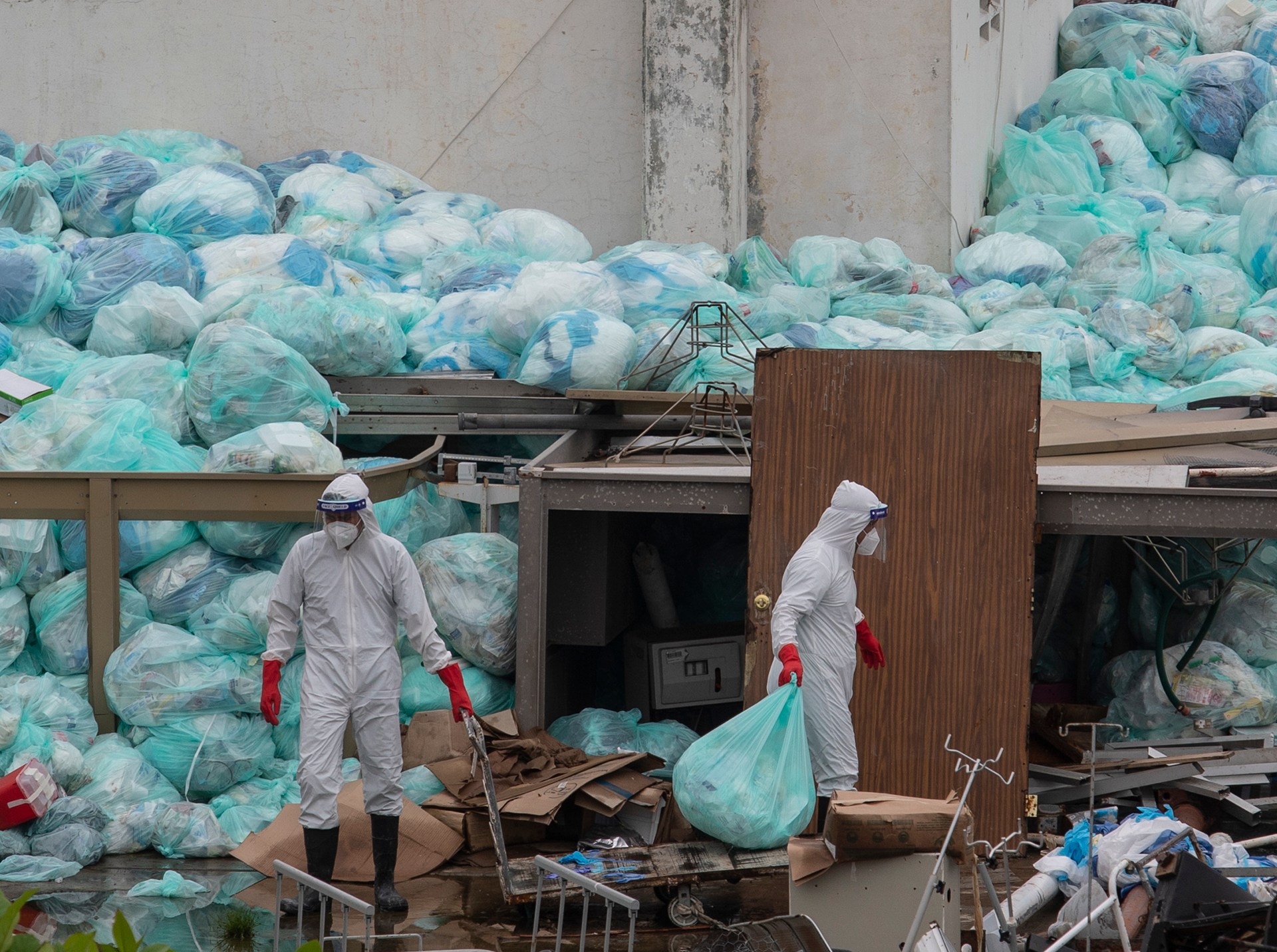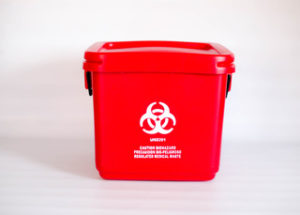Benefit at Your Front Door: Situating Reliable Medical Waste Removal Near Me
Benefit at Your Front Door: Situating Reliable Medical Waste Removal Near Me
Blog Article
The Value of Appropriate Garbage Disposal Practices
From the effects of improper waste disposal on our atmosphere to the long-lasting ramifications for future generations, the relevance of taking on sustainable waste monitoring practices can not be overstated. By discovering the ecological influence of reckless waste disposal, the advantages of recycling efforts, and the relevance of neighborhood engagement in waste decrease efforts, a deeper understanding of why correct waste disposal practices are vital arises.
Environmental Influence of Improper Disposal
Incorrect disposal of waste presents a significant danger to the atmosphere due to its destructive impacts on ecosystems and human health and wellness. When waste is not appropriately handled, it can lead to air pollution of the water, dirt, and air, triggering injury to numerous plant and animal varieties. click here. Chemicals and toxic substances from poorly disposed waste can leak into the ground, infecting groundwater resources and influencing the health of both wild animals and people
Additionally, the buildup of waste in garbage dumps produces greenhouse gases like methane, adding to environment modification and international warming. Improper disposal techniques likewise result in littering, which not just weakens the aesthetic value of the setting however can also hurt wild animals via consumption or complication.
To minimize these environmental influences, it is vital for people and communities to embrace appropriate waste disposal methods such as reusing, composting, and responsible hazardous waste disposal. By taking these steps, we can aid protect ecosystems, maintain natural resources, and guard human health and wellness for future and current generations.
Benefits of Recycling Programs
On a regular basis participating in reusing programs provides countless advantages for both the setting and culture all at once. Among the essential benefits of recycling is the preservation of all-natural sources. By reusing materials such as paper, plastic, glass, and metal, less raw materials require to be removed from the planet, bring about lowered deforestation, mining, and drilling tasks. This conservation of resources not just assists in preserving ecological equilibrium however also contributes to sustainable development.
In addition, recycling plays an important function in lowering energy intake and greenhouse gas discharges. The production of products from recycled products typically calls for less energy contrasted to making from virgin sources - medical waste removal near me. Because of this, the carbon impact connected with the production procedure is significantly lowered, helping in the battle against climate adjustment
Additionally, reusing programs produce work chances in the reusing industry, promoting financial development and social welfare. By urging the recycling and reuse of materials, these programs support a round economic climate that reduces waste generation and takes full advantage of resource effectiveness, eventually resulting in a cleaner, greener future for generations ahead.
Contaminated Materials Administration Standards
Applying efficient contaminated materials monitoring guidelines is critical for reducing environmental and health risks related to the inappropriate disposal of hazardous products - click here. Proper handling, therapy, and disposal of contaminated materials are vital to avoid contamination of soil, water sources, and air
One trick guideline is proper labeling of contaminated materials containers to make sure risk-free handling and transportation. In addition, centers must comply with stringent storage needs to avoid leakages, spills, or accidents that might jeopardize human health and the environment. Routine training programs for workers on contaminated materials monitoring practices are additionally crucial to make sure conformity with regulations and advertise a culture of safety.
Moreover, harmful waste ought to be set apart based upon its residential or commercial properties to avoid chemical responses that might lead to dangerous circumstances. Implementing a detailed waste radar can help check the motion of hazardous products from generation to disposal, making certain transparency and click this liability. By adhering to these guidelines diligently, industries and companies can add to a safer and cleaner environment for future and present generations.
Area Involvement in Waste Decrease
To properly attend to the environmental and wellness risks linked with hazardous waste monitoring, involving the area in waste reduction campaigns is extremely important. Neighborhood involvement plays a crucial role in promoting lasting waste management practices and promoting a society of environmental obligation. By educating locals regarding correct waste segregation, recycling, and composting methods, areas can considerably lower the amount of waste sent out to garbage dumps, thereby decreasing environmental contamination and preserving natural deposits.
Neighborhood engagement in waste decrease programs additionally aids in raising awareness regarding the significance of waste reduction and urges individuals to embrace environmentally friendly habits in their lives - medical waste disposal. Joint initiatives between regional authorities, waste management companies, and area participants can result in the execution of effective waste reduction techniques customized to the particular requirements of each neighborhood or town
Additionally, neighborhood involvement fosters a feeling of ownership and accountability among residents, empowering them to take positive steps towards decreasing waste generation and promoting a cleaner, healthier setting for current and future generations. By collaborating in the direction of typical waste decrease objectives, communities can make a significant effect on minimizing the unfavorable effects of improper garbage disposal practices.

Future of Sustainable Waste Practices
Traditional waste disposal approaches, such as landfilling and incineration, are no longer lasting in the lengthy term due to their considerable environmental influences. Moving ahead, the future of sustainable waste techniques exists in welcoming a circular economic situation strategy, where sources are reused, recycled, or repurposed to lessen waste generation.
Technical advancements play a crucial role in forming the future of lasting waste practices. Advanced waste sorting and reusing modern technologies can assist enhance the effectiveness of waste monitoring processes, enabling the recovery of beneficial sources from waste streams. In addition, the fostering of naturally degradable products and composting techniques can help in reducing the quantity of natural waste ending up in landfills, therefore alleviating greenhouse gas emissions.
Furthermore, promoting customer recognition and education and learning on proper waste partition and disposal practices is vital for driving behavioral change in the direction of sustainability. By fostering a culture of waste recycling, reuse, and decrease, neighborhoods can collectively add to a cleaner and much healthier atmosphere for future generations.

Verdict
Finally, correct waste disposal techniques are critical for decreasing environmental impact and promoting sustainability. By applying reusing programs, taking care of unsafe waste properly, and encouraging neighborhood participation in waste reduction initiatives, we can function in the direction of a cleaner and healthier environment. It is essential for services, federal governments, and individuals to focus on lasting waste methods for the future health of our planet.

From the consequences of improper waste disposal on our environment to the long-lasting implications for future generations, the importance of adopting lasting waste monitoring methods can not be overstated. By checking out the ecological influence of irresponsible waste disposal, the benefits of recycling efforts, and the relevance of community interaction in waste decrease initiatives, a much deeper understanding of why correct waste disposal techniques are crucial emerges.
By informing locals concerning appropriate waste partition, recycling, and composting strategies, communities can dramatically reduce the quantity of waste sent out to landfills, thereby minimizing ecological pollution and saving all-natural resources. (click here)
Moving forward, the future of sustainable waste methods lies in embracing a circular economic situation approach, where sources are recycled, recycled, or repurposed to lessen waste generation.
Advanced waste sorting and recycling innovations can help enhance the efficiency of waste management processes, permitting for the healing of useful resources from waste streams.
Report this page